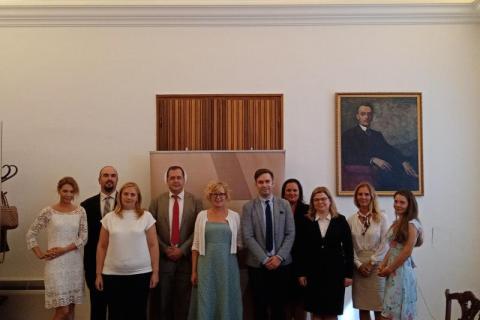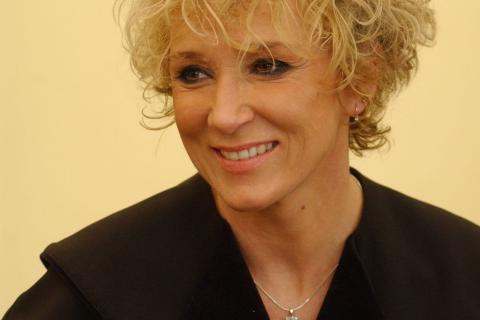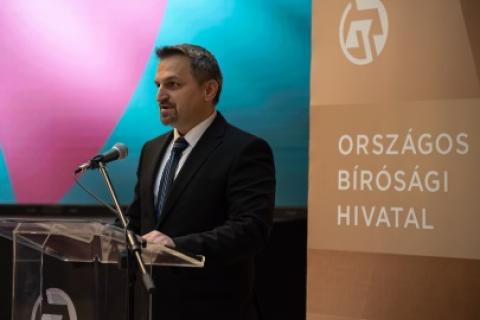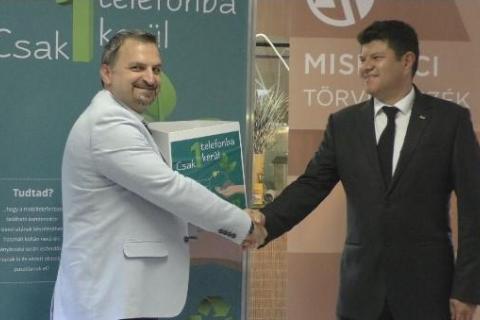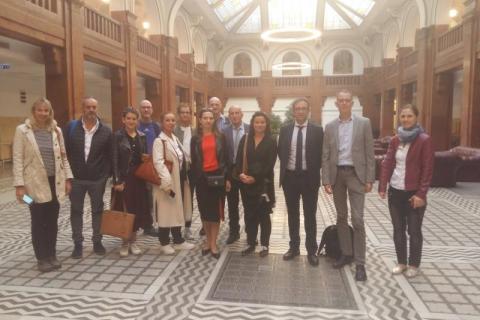Detailed search
On the opening day of the training for local court leaders at the Hungarian Academy of Justice, dr. Tünde Handó, the President of the National Office for the Judiciary (NOJ) expressed that leadership approach, awareness, and a broadened-mind vision is an expectation for court leaders. Training focuses primarily on social skills, so-called soft skills.
The world’s best stenographers, typists and court reporters matched their knowledge at the 52nd Intersteno Congress and World Championship that took place in Cagliari, Sardinia between 13-19 July. Several Hungarian court professionals attended the event, e.g. Krisztina Kollárikné Terjéki, clerk of the XVIII-XIX. District Court of Budapest, who finished second in the category of Note Taking and Reporting.
A Werbőczy Mundus scholar will spend his internship at the European Court of Human Rights (ECHR) in Strasbourg for the first time in history. Starting in September a Hungarian lawyer will spend several months at the Strasbourg-based European institution along with his fellows working at the Academy of European Law (ERA) in Trier and at the Court of Justice of the European Union (CJEU) in Luxembourg.
The National Judicial Council (NJC) was held its last meeting on 10th of May.
The National Office for the Judiciary (NOJ) is hosting a Conference celebrating the 15th anniversary of Hungary’s accession to the European Union on 27 May 2019, where dr. Tünde Handó, President of the NOJ and Tamás Vargha, state secretary at the Ministry of Foreign Affairs and Trade will give solemn opening speeches.
Dr. Gabriella Kiss has been entrusted with the presidential tasks at the Szeged Regional Court of Appeal starting from 1st April for a fixed period of one year – announced Dr. Tünde Handó, President of the National Office for the Judiciary (NOJ), at the judicial general meeting.
A little more than a year ago, on 15 March 2012 the National Judicial Council (NJC), the central supervisory body of court administration, commenced its work. On the occasion of this anniversary, dr. Sándor Fazekas, president-in-office of the board comprised of fifteen members held a press conference after a session on 16 April.
The National Office for the Judiciary (NOJ) has created a cultured, convenient, simple, fast and secure administration environment for the satisfaction of its clients, thus Hungary has added a new chapter in the area of developments in the field of court support - emphasized dr. Árpád Répássy, vice-president of the NOJ, at the closing event of the Operational Program for Public Administration and Public Service Development (KÖFOP).
The National Council for the Judiciary continued its work regarding the creation of the ethical codex on its session of the 8th of April, 2014.
On its session of the 8th April, 2014 the National Council for the Judiciary discussed the operative regulations of section 1, point e) of the 103 paragraph of the Act on the Organisation and Administration of Courts that ordered to its jurisdiction the timely tasks regarding the approval of the Ethical Codex of Judges.
Members of the Miskolc Regional Court staff gathered 274 unnecessary telephones, as the Regional Court joined the environmental campaign “It only costs one phone” of the Miskolc Zoo.
This year the annual two-week-long, short-term program by the European Judicial Training Network was held from the 16th of September. The Hungarian judiciary welcomed foreign judges from all around Europe. This year there were 12 participants from Germany, Spain, Italy, Portugal, Finland, France, Poland and Estonia. The programs took place in Budapest on the first week, and then in Debrecen and Győr on the second week.


